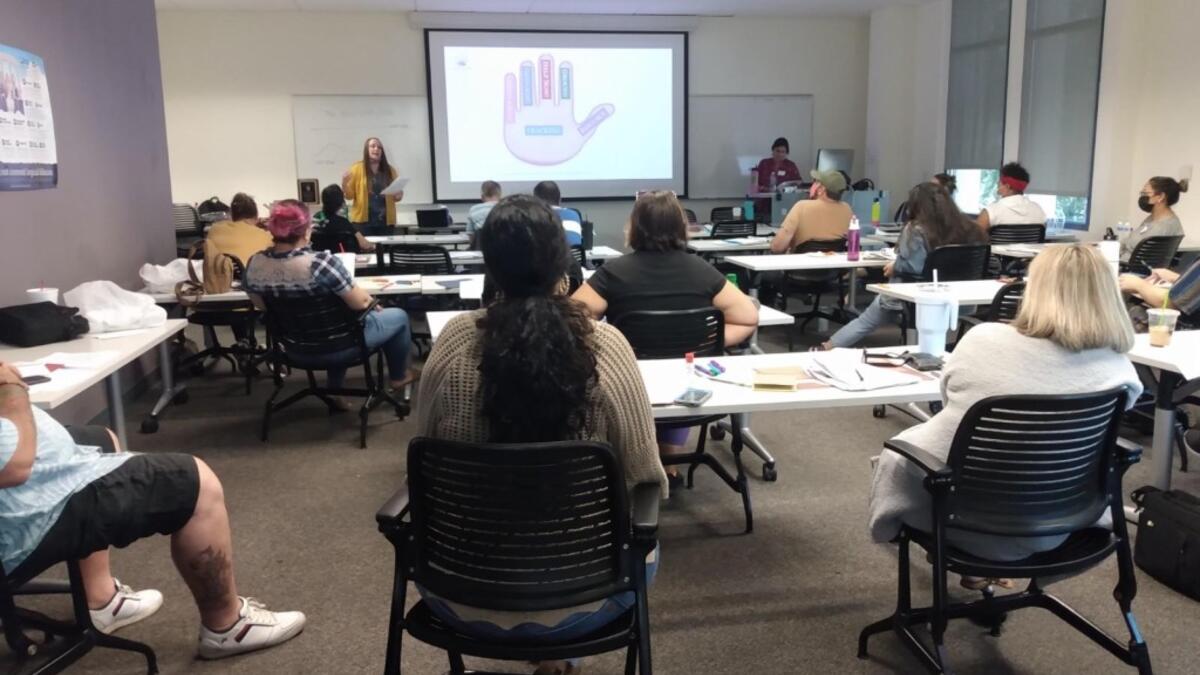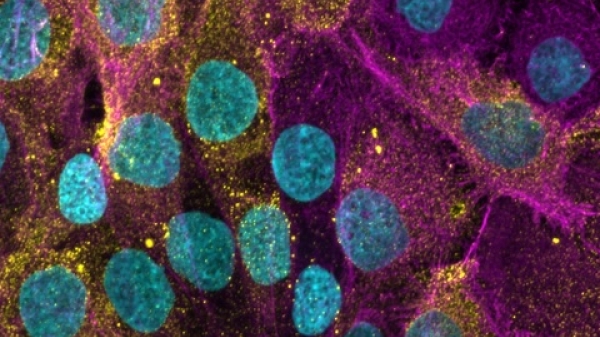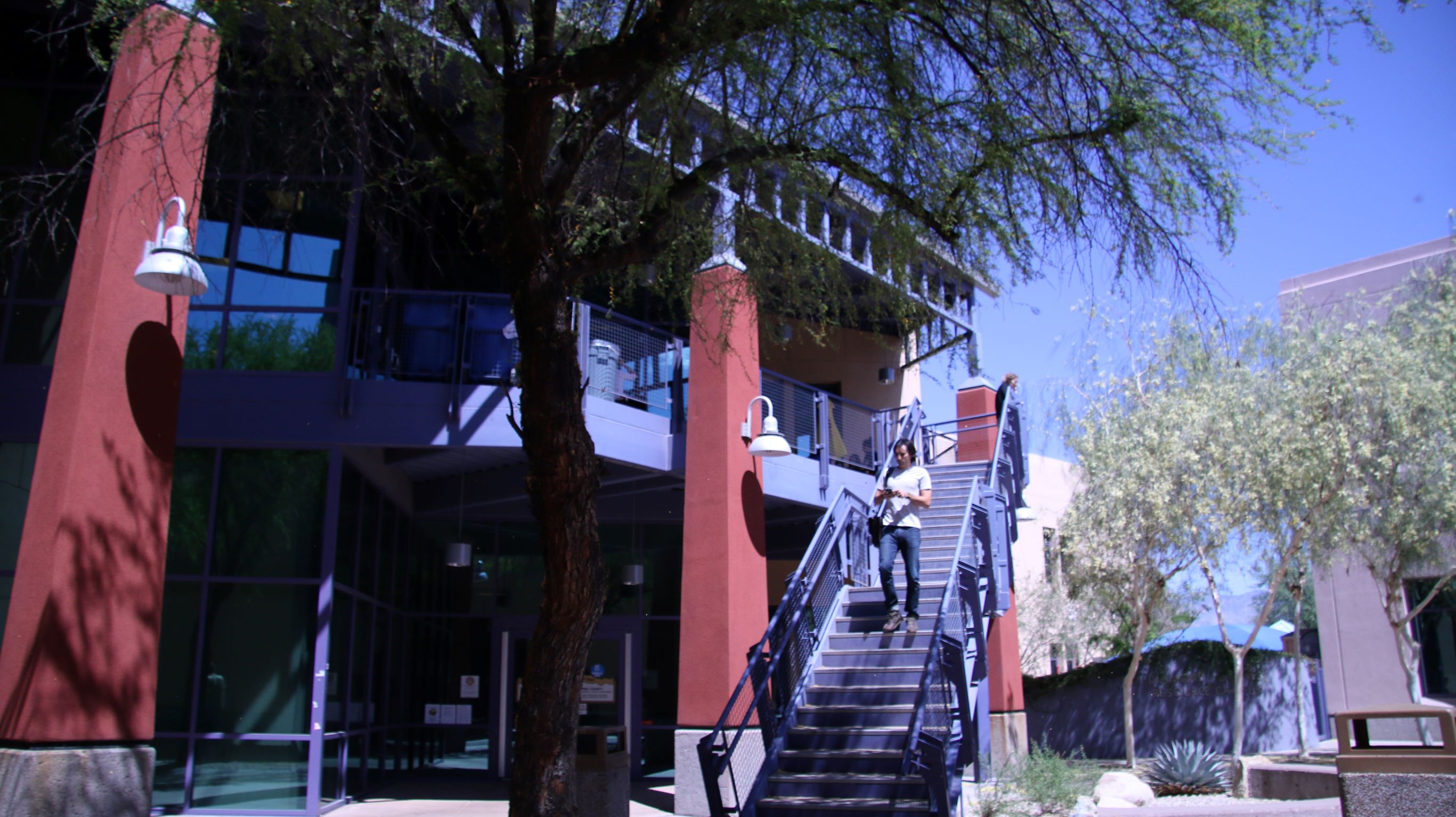School of Social Work secures $11M in federal grants to fund community health education, research

Participants listen to a recent training session at ASU's School of Social Work location in Tucson. Photo by ASU
Community health workers impact the lives of residents of underserved areas where basic health services are often scarce. Over the next five years, Arizona State University’s School of Social Work will train hundreds of workers from all over the country, teaching skills designed to improve the health and welfare of thousands of children and families.
The school will also conduct a four-year, national study of COVID-19-related public health efforts, said Mary-Ellen Brown, a School of Social Work associate professor and director of the School of Social Work-based Office of Community Health Engagement and Resiliency in Tucson.
Two federal grants totaling $11 million fund the training and the study, each based at the School of Social Work's Tucson location. Each involves the important services community health workers provide in many communities of color and other underserved areas, said Brown, who is principal investigator of both projects.
“Community health workers are increasingly recognized as a vital workforce in public health efforts to strengthen communities. They are a lifeline to connect health and social service providers with community members that are at heightened risk and suffer disproportionately from toxic stress, chronic disease and illness, such as COVID-19,” Brown said.
“For the social work profession, they are essential partners in promoting social justice and empowerment. The research and training provided through these projects will fill an important gap by promoting culturally centric, trauma-informed and resilience-building health interventions.”
School of Social Work Director Elizabeth Lightfoot said the two initiatives fit well with the school’s community-engagement mission and will expand school's reach in the Tucson area.
“These two initiatives focus on alleviating traumatic stress, which unfortunately has been a byproduct of the COVID-19 pandemic,” Lightfoot said. “Therefore, the important work our researchers will be doing aligns with our commitment to communities in Tucson and across Arizona, and will have a significant effect on community health in other parts of the country.”
National training center for community health workers
The $3 million, five-year grant to the School of Social from the U.S. Substance Abuse and Mental Health Services Administration is funding the new national Center for Community Health and Resiliency, which will train hundreds of community health care workers from across the country.
The center, which opened Sept. 30 at the Tucson location, will serve community health workers who are seeking specialized training to deliver culturally responsive interventions to children and families experiencing traumatic stress, Brown said.
The ASU School of Social Work's Tucson location. Photo by ASU
The center will conduct intervention research, including cultural and linguistic adaptations of evidence-based practices, develop a virtual toolkit and a certificate program, and offer virtual and in-person trainings.
Over the five-year life of the project, 2,500 community health workers will be trained to use the Trauma and Resilience Toolkit; 1,000 will be trained through webinars; 1,750 will be trained in specialized interventions to support children experiencing traumatic stress; 2,000 will be trained to screen for child and adolescent trauma; and 3,000 will be certified through the Community Health Worker Healing and Resilience from Trauma Certificate Program, Brown said.
The workers are or will be serving in communities largely populated by persons of color, she said.
ASU is home to another research center funded by a $3 million Substance Abuse and Mental Health Services Administration grant for a similar purpose. The Center for Resilient Families aims to raise awareness of and increase access to family education, prevention and intervention resources to promote resilience in traumatized children, said program manager Monique Lopez. The center recently moved to ASU’s Research and Education Advancing Children’s Health (REACH) Institute on the Tempe campus after being located for 15 years at the University of Minnesota.
Examining how disparities in access are addressed
Brown said the Office of Community Health Engagement and Resiliency entered a cooperative agreement with the Centers for Disease Control and Prevention Aug. 31 to begin the $8 million, four-year national COVID-19 study. The office will use the funds to examine the effectiveness of different approaches community health workers use to build public health infrastructure and address health disparities, including access to COVID-19-related services in underserved communities. The study includes 68 local and state public health agencies, tribal nations and U.S. territories, she said.
“One of the things I am most excited about is that we will be able to hire cultural navigators to make sure the research is culturally responsive and relevant,” Brown said.
The study will involve creating national performance indicators, conducting special studies and providing technical assistance for the 68 sites, she said. Researchers will examine how the interventions by community health workers were implemented and will recommend practices and policies for improvements.
More Health and medicine

80 years of pioneering speech and hearing services for the community
Over 80 years ago, in 1937, the first course in communication disorders, Speech Correction, was offered at Arizona State…

First 2 degree offerings from ASU Health available in fall 2025
The first degree offerings from ASU Health will help students find jobs in the modernized health care system.The one-year…

ASU study uses new biomaterials for wound healing
A minor cut often heals within days, vanishing without a trace. Yet, wound healing and tissue repair are complex biological…
